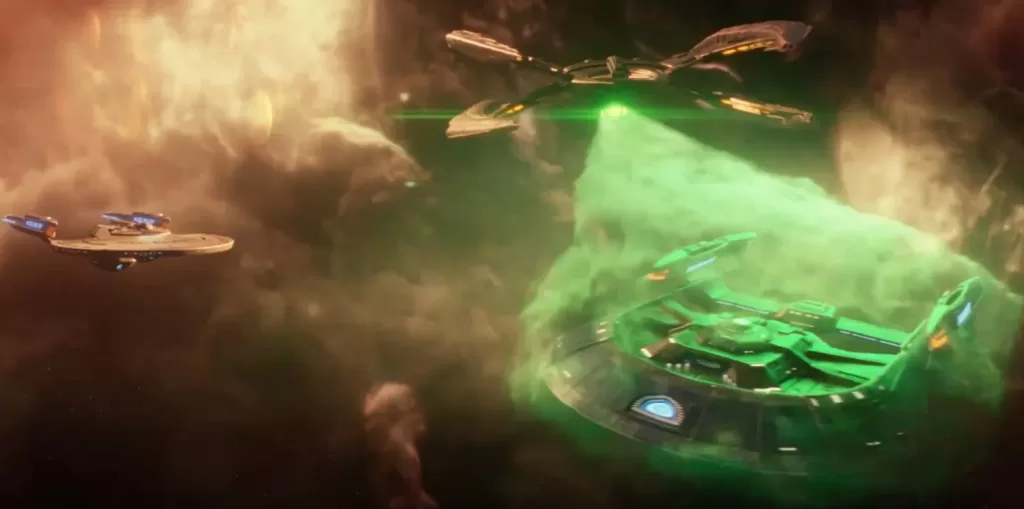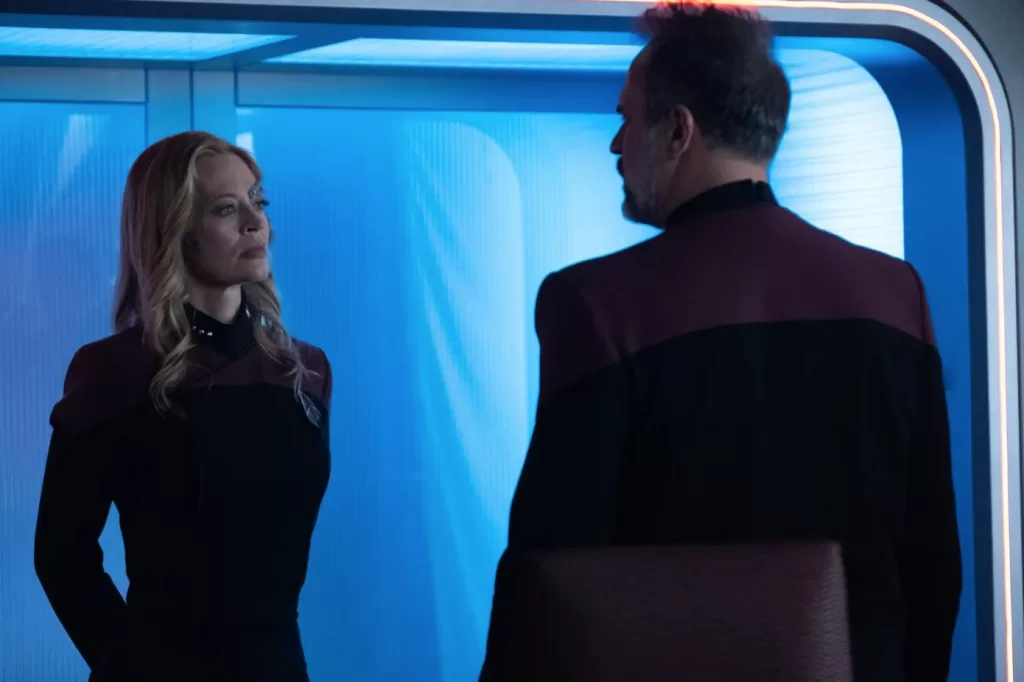If a twist is so predictable that your entire audience guessed it the moment you released your cast poster, can it even be considered a twist? Maybe so in the era of peak TV, when writers often seem more concerned with being unpredictable than decent (or even coherent) storytelling; the biggest twist is that there is no twist. Still, if narrative satisfaction is what the writers were going for here, even accepting that it was predictable, they could’ve done it with a little more finesse.
The first episode of Star Trek: Picard‘s final season introduced us to Beverly Crusher’s son while the good doctor was unconscious in a medical pod. The second episode, “Disengage,” gives us a better idea of just who this guy is, as we’re shown a flashback to Jack Crusher (as his name is revealed) trying to Han Solo his way onto a restricted planet. Then in the present, he displays a similar kind of arrogance and foolhardiness that prompts Riker —and the audience—to notice the similarity to Picard around that age. The episode then proceeds to drag out the question of, “Could this be Picard’s secret son?” for the rest of the hour.
In a world where “science” can turn people into lizards and back again, you’d think it’d be easy enough to run a paternity test. And yet even after Picard, Riker, and Jack make it onto the Titan with its shiny Starfleet medical equipment, no one even suggests it.

Meanwhile, Shaw reveals that Jack is a con man wanted for a litany of crimes (though none of them particularly violent), and the one who attacked the Crushers turns out to be a woman named Vadic, who has a super-powerful ship that threatens even the Titan and who’s after Jack for said transgressions. Cue a classic trolley problem-type dilemma: Do you hand over someone for brutal frontier justice to protect the good citizens on your ship, or do you risk hundreds of lives for one guy?

You can guess which one Shaw, introduced as the jerkiest of jerk-faces last week, will choose, and why that might put him at odds with our classic crew (Picard, Riker, Seven) whose lives (and the lives of those they care about) matter more than any of the anonymous uniformed extras.
It should surprise exactly no one that by the end of the episode, Picard declares that Jack is his kid. Seriously, I don’t think this even deserves to be called a “reveal” or “twist” when it was so, so obvious from the beginning. In fact, it was so ridiculously obvious, that I seriously hoped it would turn out to be misdirection—let us assume Beverly’s son, who she never told Picard about, is Picard’s but actually there’s something more going on here. If the show was going to go for the obvious, they would have been better off not raising the question at all, and simply included “oh, and by the way, you have a son, Jean-Luc” in Beverly’s original distress call.

The episode wasn’t satisfied with one uber-obvious “twist,” though. After the destruction of a Starfleet recruitment center last week, Raffi, guilt-stricken for not having been able to stop the carnage, decides to go after the truth despite being told to stand down by her mysterious handler – who by the end of the episode turns out to be exactly who everyone expected him to be: our favorite Klingon, Worf.
Seriously, Star Trek, why bother with the secrecy at all if you’re going for the expected?
For all its narrative flaws, the episode was still fairly enjoyable, if bland. Ed Speleers does an excellent job of bringing Jack to life and making him charming enough that you don’t want to see him thrown to the wolves. And the charged moment when Picard confronts him in the brig is the kind of drama I live for (though I think it would’ve been even more dramatic if both parties already acknowledged their relationship… guess we’ll get that next week). Of course, it’s still possible that Picard is wrong, that he’s simply Jack’s latest mark… can someone just run a paternity test already??
Overall, “Disengage” suffers from middle-chapter syndrome, serving mostly as a functional episode to get the audience from one dramatic moment to another (all my sympathy to Michelle Hurd for having to spew paragraphs upon paragraphs of exposition while talking to herself so the audience might have some idea of what she’s doing next and why). But in a show like Picard, where we’re going to keep watching no matter what because we want to see our faves once again, I suppose it doesn’t really matter.
Rating: 3/5 stars
